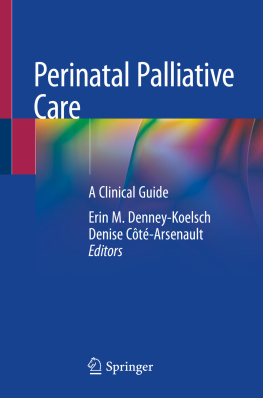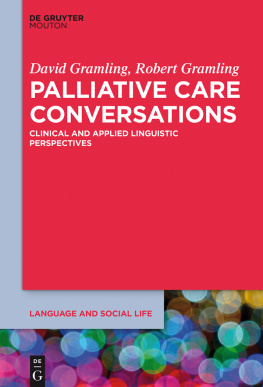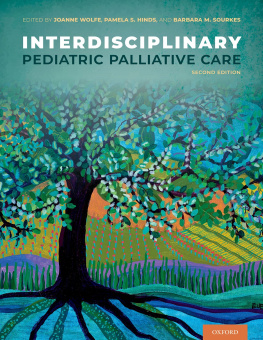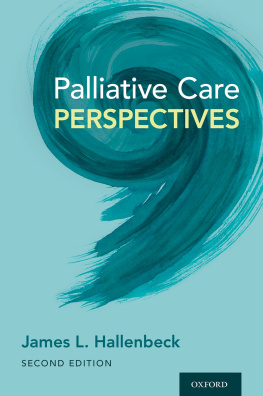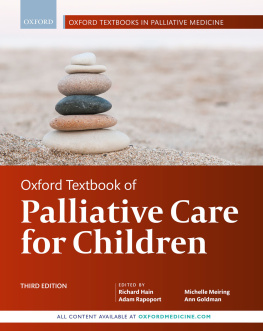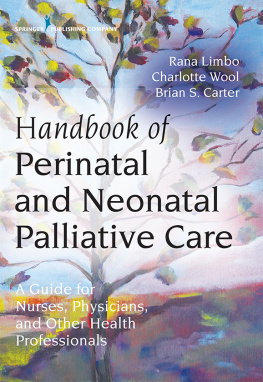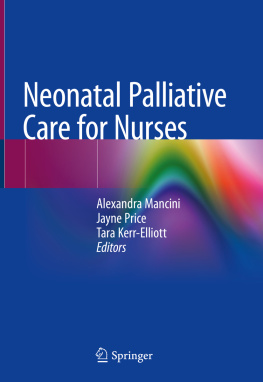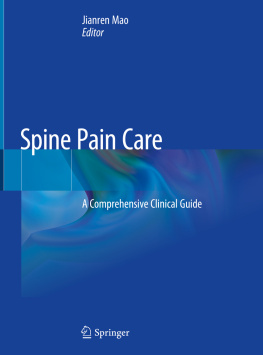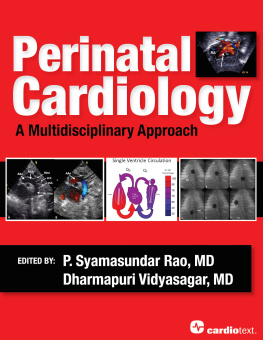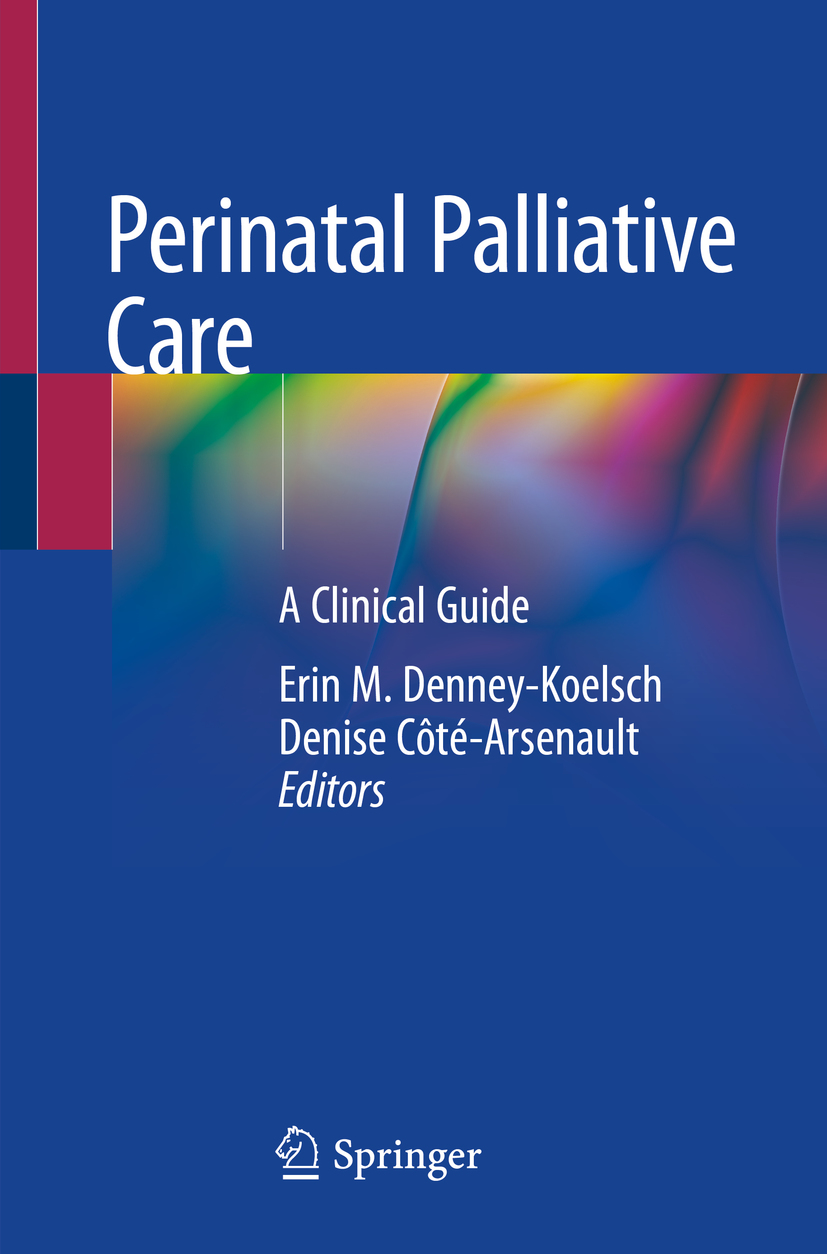Editors
Erin M. Denney-Koelsch and Denise Ct-Arsenault
Perinatal Palliative Care
A Clinical Guide
Editors
Erin M. Denney-Koelsch MD, FAAHPM
Strong Memorial Hospital, University of Rochester, Rochester, NY, USA
Denise Ct-Arsenault PhD, RN, CPCL, FNAP, FAAN
School of Nursing, Saint Louis University, Saint Louis, MO, USA
ISBN 978-3-030-34750-5 e-ISBN 978-3-030-34751-2
https://doi.org/10.1007/978-3-030-34751-2
Springer Nature Switzerland AG 2020
This work is subject to copyright. All rights are reserved by the Publisher, whether the whole or part of the material is concerned, specifically the rights of translation, reprinting, reuse of illustrations, recitation, broadcasting, reproduction on microfilms or in any other physical way, and transmission or information storage and retrieval, electronic adaptation, computer software, or by similar or dissimilar methodology now known or hereafter developed.
The use of general descriptive names, registered names, trademarks, service marks, etc. in this publication does not imply, even in the absence of a specific statement, that such names are exempt from the relevant protective laws and regulations and therefore free for general use.
The publisher, the authors, and the editors are safe to assume that the advice and information in this book are believed to be true and accurate at the date of publication. Neither the publisher nor the authors or the editors give a warranty, expressed or implied, with respect to the material contained herein or for any errors or omissions that may have been made. The publisher remains neutral with regard to jurisdictional claims in published maps and institutional affiliations.
This Springer imprint is published by the registered company Springer Nature Switzerland AG
The registered company address is: Gewerbestrasse 11, 6330 Cham, Switzerland
Foreword
When I first heard Drs. Denney-Koelsch and Ct-Arsenault in 2015 present data from interviewing parents who had experienced carrying a fetus with a lethal diagnosis, I knew the field of perinatal palliative care was entering a new phase. For the prior two decades, a variety of practitioners had been quietly supporting families who learned their fetus had a life-limiting condition. Hospice nurses, obstetricians, neonatologists, palliative care doctors, social workers, and others were all working at a grassroots level trying to do better for these grieving families. Sometimes, they worked in teams, but often, they practiced alone. All were operating from first principles bring compassion and the ideals of palliative care into the perinatal space. No one knew for sure if their approach would ease the grief families were experiencing, but it was clear there was a need to do better.
Erin Denney-Koelsch and Denise Ct-Arsenault had captured something fundamental. A major driver of decision-making was a desire to avoid regret. For me, it was a eureka moment. Families were in fact struggling with the challenges we thought they were. It was validating to hear that families wanted what we were providing a safe space to explore what it meant to be a parent under the hardest circumstances and a compassionate ear to help them think through how best to care for their baby. Since hearing that talk, qualitative research and published experience have grown tremendously. Perinatal palliative care has become a field in its own right with an early evidence base. Formal teams have been created, best practices are being shared, and families are becoming more aware that help is available.
The very existence of this book is affirmation for those of us who have engaged in this work. It is filled with crystal clear summaries of evidence-based practice, as well as practical advice for addressing everything from psychosocial needs to pain management and from spiritual care to care coordination. By its very nature, perinatal palliative care deals with the rare, so having a source to turn to that covers such a wide range of special circumstances will be invaluable. This books publication is an opportunity for all of us to improve our care. Have we engaged everyone who should be a part of our teams? Do we have all of the components in place that create a high-quality experience for our families? Are we still making it up as we go along, or is there something we should learn from others experience and published research?
I am confident that the leaves of my copy of this book will become well-worn in short order, and I will be sharing several chapters with the neonatology fellows in our training program at the Childrens Hospital of Philadelphia. For those who wish to enter the field by joining a perinatal palliative care team or who are considering starting a program from scratch in a hospital without one, a road map has now been provided.
All of you who meet these expectant mothers, their partners, and their families already know there is something profoundly satisfying in this work. These families embody courage, compassion, and beauty while wrestling with the most difficult existential challenges. Just as these families often feel alone, so, too, have the providers often felt alone. The power of this book is in the concrete demonstration of collective knowledge. Together, we will learn how to do this right.
David Munson
Philadelphia, PA, USA
Preface
Our work together, as research colleagues, began when we were both at the University of Rochester: Erin Denney-Koelsch as a Medicine-Pediatrics-Trained Palliative Care Fellow and Denise Ct-Arsenault a Maternal-Child Nurse Academic with research focused on parent experiences of perinatal loss and subsequent pregnancies. The field of perinatal palliative care (PPC) had not yet emerged in central New York, but the need for such care was becoming evident with parents choosing to continue their pregnancy after learning of their babys life-limiting fetal condition (LLFC). The literature on PPC was thin, and research on the topic was scarce. From our shared interest sprang a pilot study can we work together? Will parents talk to us?
Clearly, the answer to both questions was a resounding yes! And thus began our collaboration: nurse researcher and palliative care physician. Our research and the work of many others have expanded our understanding of what couples go through and what their needs are during their very challenging pregnancies. However, we have still found that there was a lack of adequate resources to guide the large number of people who care for these families. It is out of this inadequacy and the growing expertise that now exists in PPC that this book was formed.
We have put together a book that seeks to address the current evidence, expert opinions, and recommendations for the comprehensive care of families dealing with one of the worst moments of their lives. We turned to our esteemed colleagues from across the country to share their tremendous knowledge and wisdom so that care for families faced with LLFC is of the highest level and the field of PPC develops strong standards of care of the highest quality.
The organization of this book allows for reading the chapters in the order they are presented, while at the same time, each chapter stands on its own and will be a useful reference on the stated topic. The topical areas range from the theoretical to the clinical and practical levels. Chapters include tables and figures designed for easy reference. PPC is unique in that there are two patients: the mother and the fetus or baby. Because of this maternal-fetal dyad, there are multiple specialities and disciplines involved in their care. We have aimed to speak to all care team members caring for families with imperiled pregnancies, from obstetrics and maternal-fetal medicine, nursing, genetic counseling, neonatology, palliative care, social work, parent advocates, bereaved parents themselves, certified child life specialists, bereavement therapists, chaplains, legal experts, and ethicists. This book should be relevant to all who care for these families.

